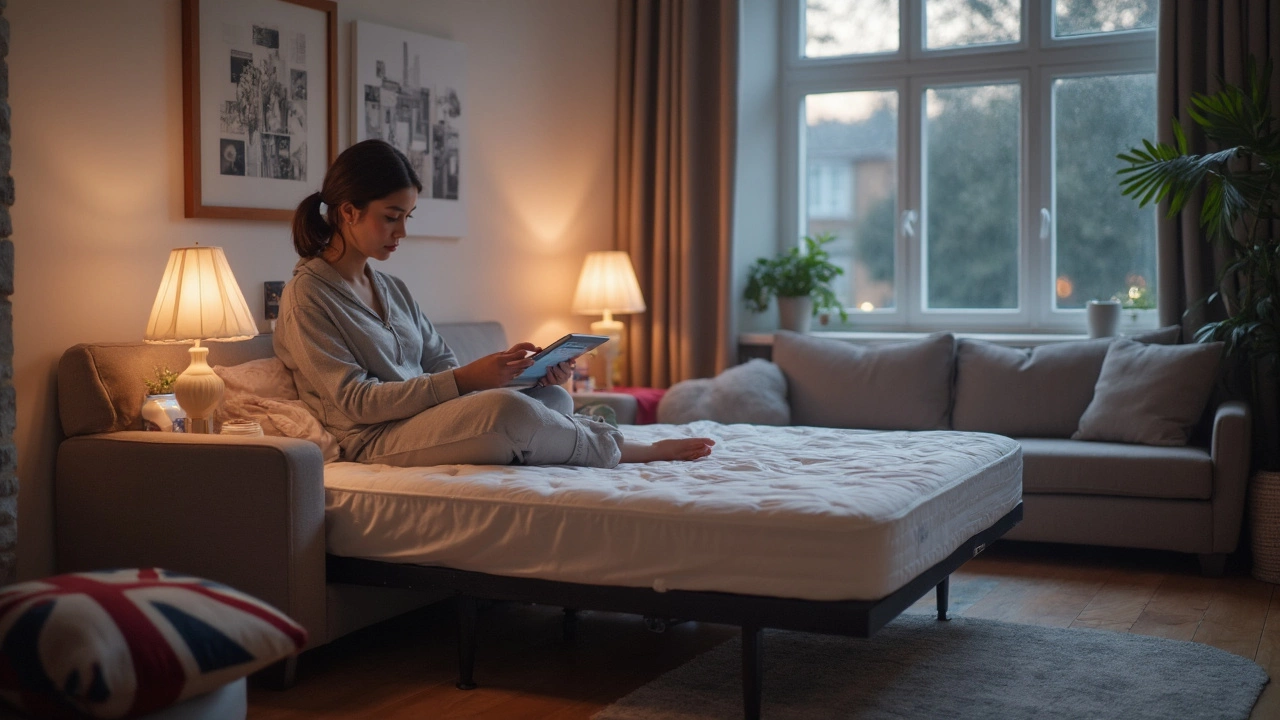Ever crashed on a sofa bed and woken up feeling like you slept on a bag of rocks? You’re not alone. A lot of folks wonder if sofa beds are actually any good for your health or if they’re just a last-resort guest bed that should be avoided whenever possible. The big deal with sofa beds comes down to two things: support and comfort. If those are off, your sleep and even your back might pay the price.
Let’s get real: not all sofa beds are built the same. Some have thin, lumpy mattresses that practically guarantee a rough night. Others, especially newer models, have come a long way and might surprise you with how solid they feel. But if you’re choosing a sofa bed for regular use, you really need to pay attention to the mattress part, not just how it looks folded up in your living room. Thin foam, those old-school spring mattresses, and a bumpy folding mechanism can leave you hurting after just one night.
- How Sofa Beds Stack Up Against Regular Beds
- Common Health Issues Linked to Sofa Beds
- What to Look For in a Healthy Sofa Bed
- Tips to Improve Sleep Quality on Sofa Beds
- Who Should Avoid Sleeping on Sofa Beds
How Sofa Beds Stack Up Against Regular Beds
When you put sofa beds next to regular beds, the difference is pretty obvious. Regular beds are built for one job: helping you sleep well. Sofa beds are trying to be both a couch and a bed, which means they make some trade-offs. The mattress on a typical sofa bed is thinner—usually just 3 to 5 inches. Compare that to a standard mattress, which is often 8 to 12 inches thick. Thicker mattresses give better support for your back and joints, while thinner sofa bed mattresses have to fold and fit inside a couch, so support usually takes a hit.
Sleep health experts have found that getting the right support while you sleep is key to waking up without aches and pains. Softer, uneven surfaces (like an older sofa bed) can make your spine curve in ways you really don’t want. This can lead to soreness or even make back pain worse. Mattresses on real beds are designed to keep your body in a natural position. Even the best sofa beds rarely match that kind of ergonomic support.
| Feature | Sofa Bed | Regular Bed |
|---|---|---|
| Average Mattress Thickness | 3-5 inches | 8-12 inches |
| Spinal Support | Usually below average | Consistently good (if chosen well) |
| Intended Use | Temporary/occasional | Nightly, long-term |
There are new sofa bed models with memory foam and better support systems, but even those struggle to beat a dedicated bed. If you’re fine with a few nights’ sleep or if you have guests once in a while, a decent sofa bed might work for you. If you’re planning to sleep on it every night, it’s best to test lots of models and check for solid construction and good-quality foam. Otherwise, you’re likely trading long-term sleep health for convenience.
Common Health Issues Linked to Sofa Beds
If you've ever woken up sore after a night on a sofa bed, you know they're not always the healthiest sleep option. The biggest complaint? Back pain. That shaky, thin mattress can't give your spine the support it really needs. One study published in 2020 tracked people using sofa beds for a week and found that nearly half had more back stiffness and ache compared to sleeping on their regular mattress. No surprise there—many sofa beds have a bar running under the mattress that pokes you right in the ribs or lower back.
Poor mattress support can mess with your sleep posture. When your body sags in funny angles, it's rough on your hips and shoulders too. Some folks end up tossing and turning, trying to find a comfortable spot, which means less deep sleep. Over time, using a sofa bed every night can even kick up neck pain or chronic joint stiffness, especially if you're over forty.
Allergies love older sofa beds too. Dust mites hang out in thick fabrics and old foam, which can trigger sneezing or asthma, especially for folks who are sensitive. If your sofa bed lives folded up most of the year, it’s probably not getting as much air or cleaning as your usual bed.
| Health Issue | % Reporting Symptoms (1 week study) |
|---|---|
| Back Pain | 48% |
| Poor Sleep Quality | 41% |
| Neck Stiffness | 32% |
| Allergy Flare-Ups | 23% |
It’s not all doom and gloom, though. For the occasional guest, roughing it on a sofa bed isn’t likely to cause long-term problems. But if you’re planning to use one every night, these health headaches can start to stack up. Knowing what’s actually going on with your body helps you decide if a sofa bed is really the right pick for your setup.

What to Look For in a Healthy Sofa Bed
If you want your sofa bed to actually support your back and give you decent sleep, you have to shop smarter. Don’t just check out how it looks—test it out and see how it feels. Your back and sleep quality depend on how well the mattress and support system work together.
First, look at the mattress. A thin or saggy mattress is the fastest way to wake up sore. Go for memory foam or pocket spring mattresses with at least 4 to 5 inches of thickness. Anything less and you’ll feel those metal bars—or worse, the floor. Avoid those all-in-one "futon" types if they’re barely padded. You want a legit mattress, not just some fluff.
The frame matters too. A solid, sturdy frame with a seamless folding mechanism cuts down on weird pressure points and keeps your spine in line. If you hear creaks and rattles when you open or close it, that’s a red flag the bed might not support you the right way. Test how easy it is to switch from sofa to bed. If you struggle with the conversion every night, you’re more likely to tweak your back.
If you’ve got back pain or need extra support, see if the brand offers extra topper pads. Adding a quality mattress topper can make even a so-so sofa bed much more livable, especially for overnight guests or if you use it every night.
- Mattress Thickness: Aim for 4" or more.
- Mattress Type: Memory foam and pocket coil styles beat futons and old-school springs for support.
- Frame Quality: Metal frames are standard, but check for solid welds and steady construction.
- Conversion Mechanism: Should be smooth—no fighting to fold it in or out.
- Warranty: Brands that offer generous warranties usually trust their build quality.
The sweet spot? A quality sofa bed for long-term use should feel as close to a real mattress as possible—a firm but cushy surface, no weird lumps, and solid support from edge to edge. If you plan to use it every night, it’s worth investing a bit more upfront for way better comfort over time.
| Feature | Ideal Specification |
|---|---|
| Mattress Thickness | At least 4-5 inches |
| Mattress Type | Memory Foam or Pocket Coil |
| Frame | Solid Metal or Hardwood |
| Weight Limit | 400 lbs or higher |
Tips to Improve Sleep Quality on Sofa Beds
If you end up sleeping on a sofa bed, you don't have to settle for a bad night. There are a bunch of down-to-earth hacks that actually make a difference.
- Upgrade the Mattress Pad: Most sofa beds come with thin, basic mattresses. Adding a memory foam or gel mattress topper (2-3 inches thick) can massively boost comfort and support. A Consumer Reports test in 2023 found foam toppers improved perceived comfort by over 50% for guests.
- Watch Your Bed Base: That bar under your back is the stuff of nightmares. Try putting a folded blanket or even yoga mats between the mattress and the bar if you don’t have a fancy modern model. It helps spread your weight and reduces pressure points.
- Keep Your Sheets Tight: Loose or bunched-up bedding makes things worse. Use deep-pocket sheets or tuck them in tight, so you don’t end up wrapped in a wad of fabric at 3 a.m.
- Pillow Check: A supportive pillow matters way more on a sofa bed than a regular mattress, especially since the surface underneath can be extra squishy or hard. Go for an adjustable pillow if you can.
- Follow a Wind-Down Routine: Even on the best bed, your sleep habits matter. Dim the lights early, avoid caffeine close to bedtime, and keep your phone away to help your brain wind down.
Extra tip—ventilate the room before sleeping. Good airflow and cool air help your body get quality rest, even on a so-so mattress.
| Mattress Topper Thickness | Reported Improvement (%) | Common Materials |
|---|---|---|
| 1 inch | 20% | Egg crate foam |
| 2 inches | 35% | Memory foam |
| 3 inches | 52% | Gel-infused foam |
Last thing—don’t tough it out if you’re waking up sore. If you use a sofa bed a lot and it’s still painful, it’s probably time to look at a higher-quality model with a proper mattress support system. Your back will thank you.

Who Should Avoid Sleeping on Sofa Beds
Sofa beds aren't a one-size-fits-all solution. While they're super handy for quick overnights or occasional guests, some people should think twice before using them as a regular sleeping spot. If you fall into one of these groups, paying extra attention can save you from pain and restless nights.
If you have existing back pain or joint issues, sofa beds can make things worse. Most sofa beds have thinner, less supportive mattresses compared to standard beds, so they don’t support your spine and joints the way your body needs. This can lead to increased soreness, especially if you’re already dealing with chronic pain. According to the American Chiropractic Association, unsupportive sleep surfaces (like old school sofa beds) are one of the top causes of morning back pain.
Pregnant women, especially in the second and third trimesters, should also avoid sofa beds. The sagging or uneven surfaces can add pressure to the lower back and hips, which are already stressed from carrying extra weight.
Older adults are another group that should look for other options. As we get older, we’re just more sensitive to pressure points and mattress dips. Thin sofa bed mattresses don’t spread out your weight evenly, so there’s a bigger risk of waking up stiff or sore.
Here’s a quick rundown of who should be careful:
- People with a history of back pain or spinal problems
- Individuals with arthritis or chronic joint pain
- Pregnant women, especially in later stages
- Older adults who are more prone to stiffness or soreness
- Anyone recovering from surgery or a recent injury
Sleep health is important for everyone, but if you fall into one of these categories, consider a proper mattress or, if you have to use a sofa bed, invest in a high-quality mattress topper for extra support. Sometimes spending a little more upfront saves a ton of frustration and pain later.


Write a comment